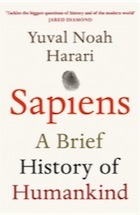 Author Yuval Noah Harari claims humans are better suited to a hunter-gatherer lifestyle:
Author Yuval Noah Harari claims humans are better suited to a hunter-gatherer lifestyle:
The march of progress from the first Sumerian city-states to the empires of Assyria and Babylonia was accompanied by a steady deterioration in the social status and economic freedom of women. The European Renaissance, for all its marvellous discoveries and inventions, benefited few people outside the circle of male elites. The spread of European empires fostered the exchange of technologies, ideas and products, yet this was hardly good news for millions of Native Americans, Africans and Aboriginal Australians.
The point need not be elaborated further. Scholars have thrashed the Whig view of history so thoroughly, that the only question left is: why do so many people still believe in it?
Um, possibly because just about everyone who can escape the hunter-gatherer lifestyle does so? Any other lifestyle seems better.
We can congratulate ourselves on the accomplishments of modern Homo sapiens only if we completely ignore the fate of all other animals. Much of the wealth that shields humans from disease and famine was accumulated at the expense of laboratory monkeys, dairy cows and conveyor-belt chickens. Tens of billions of them have been subjected over the last two centuries to a regime of industrial exploitation, whose cruelty has no precedent in the annals of planet Earth.
Nonsense. Nature is far more cruel. Humans don’t usually eat their meat alive. We kill animals who are suffering without hope of relief swiftly. Nature lets bacteria and fungi do it slowly. Now get this:
Unfortunately, the immense improvement in material conditions that affluent westerners have enjoyed over the last century was coupled with the collapse of most intimate communities.
People in the developed world rely on the state and the market for almost everything they need: food, shelter, education, health, security. Therefore it has become possible to survive without having extended families or any real friends. A person living in a London high rise is surrounded by thousands of people wherever she goes, but she might never have visited the flat next door, and might know very little about her colleagues at work. Even her friends might be just pub buddies. Many present-day friendships involve little more than talking and having fun together. We meet a friend at a pub, call him on the phone, or send an email, so that we can unload our anger at what happened today in the office, or share our thoughts on the latest royal scandal. Yet how well can you really know a person only from conversations?
In contrast to such pub buddies, friends in the stone age depended on one another for their very survival. …
Which, from a woman’s perspective, was precisely the problem! The unwanted first wife, the drudge of a tyrannical mother-in-law, the wife who did not produce sons…all were stuck with people they depended on for survival—people who might eventually turn on them, of course, or turn them out into the wilderness. For just such an incident recorded in the Bible, see here.
If those women could just have had “pub buddies” instead, they’d likely think they’d died and gone to heaven. Imagine! People you can take or leave, and it doesn’t really matter.
The modern nation state was the principle liberator of women, not the feminist movement, as often claimed. The fact that one can simply live in an apartment somewhere, go to a job, pay one’s bills, engage in lawful activities of one’s choice, and call 9-11 in case of emergency is an emancipation inconceivable to most women through history. And to a great many women alive today, I fear.
Figures the author, Yuval Noah Harari, is a guy. Only a guy could write like this about women’s lives.
It’s hard to believe that our culture has descended to such a state that anyone can believe this foolishness. Especially any woman. But watch some of them line up to get their books signed.
Never been a law, never will be, against foolishness. – O’Leary for News
See also: What can we responsibly believe about human evolution?
Follow UD News at Twitter!